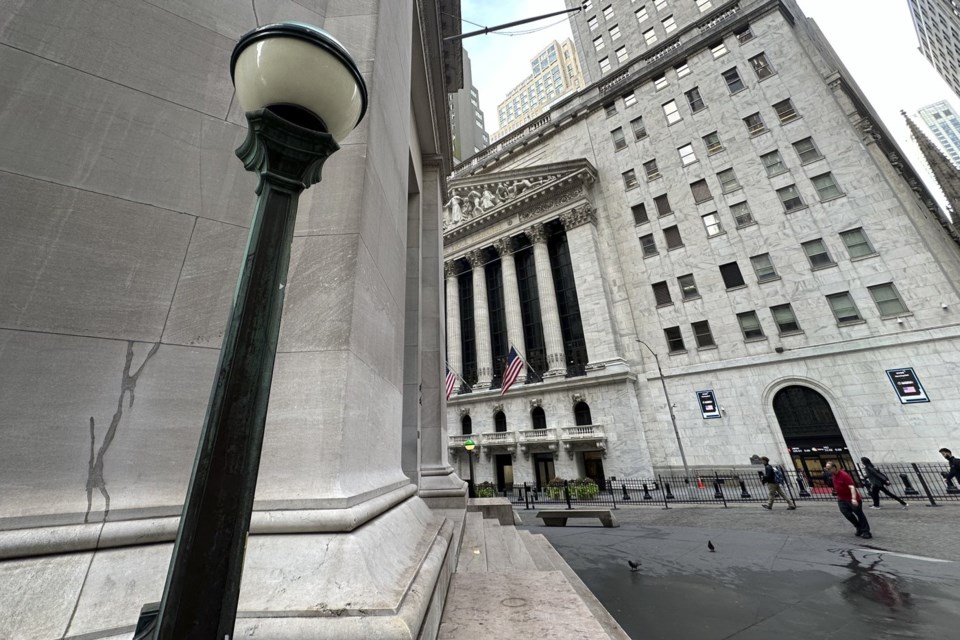NEW YORK (AP) — U.S. stocks rose to another all-time high, but a slide in oil prices kept the gains in check by weighing down energy companies. The S&P 500 rose 0.4% Thursday, setting its third record high this week. The Dow Jones Industrial Average added 0.6%, and the Nasdaq rose 0.6%. Micron Technology led the way after AI-related demand helped it deliver a stronger-than-expected profit report. Other tech companies also rose. Exxon Mobil, ConocoPhillips and other energy companies fell along with crude prices. Stock markets overseas jumped on hopes for more moves by China to prop up the world’s second-largest economy.
THIS IS A BREAKING NEWS UPDATE. AP’s earlier story follows below.
NEW YORK (AP) — U.S. stocks are rising Thursday as financial markets around the world rally again.
The S&P 500 was up 0.4% in afternoon trading and flirting with the possibility of setting an for the third time this week and the 42nd time this year. The Dow Jones Industrial Average was up 281 points, or 0.7%, as of 2:26 p.m. Eastern time, and the Nasdaq composite rose 0.6%.
Micron Technology led the way with a jump of 14% after the maker of computer memory and storage delivered stronger profit for the latest quarter than analysts expected. It pointed to sales related to artificial-intelligence technology, where a has helped drive some stocks to astounding heights.
Jabil climbed 11.8% after the electronics manufacturer likewise reported stronger profit and revenue than expected. It also announced a plan to buy back up to $1 billion of its stock to plow cash to its shareholders.
But drops for Exxon Mobil and other oil-and-gas companies were keeping the market's gains in check. Oil prices tumbled after The Financial Times reported through sources that Saudi Arabia is preparing to abandon its unofficial price target of $100 a barrel for crude as it prepares to increase output.
The price of a barrel of benchmark U.S. crude fell 3.1%, while the international standard of Brent crude fell 2.7%. That dragged Exxon Mobil’s stock down 1.4%, and it was one of the heaviest weights on the S&P 500. ConocoPhillips sank 2.7%.
A big winner of the AI frenzy, Super Micro Computer, was meanwhile giving back some of its huge gains after more than tripling last year. Its stock tumbled 11.5% following a report from The Wall Street Journal saying the U.S. Department of Justice is probing the seller of servers and storage systems. The company declined to comment.
A prominent investor, Hindenburg Research, published a report in August that accused the company of accounting red flags and other issues, which Supermicro CEO Charles Liang later said contained false or inaccurate statements.
In stock markets overseas, indexes were more jubilant on hopes for to prop up the world’s second-largest economy. The country’s powerful Politburo on Thursday called for intensified efforts as China tries to meet its goals for economic growth, according to the official Xinhua News Agency.
That follows a earlier in the week by the country’s central bank that had also sent global markets jumping. China’s economic growth has been flagging, with particular troubles in its real-estate industry, and Chinese officials appear to be making a more coordinated effort to boost it following earlier piecemeal attempts.
In the United States, meanwhile, more encouraging news came after a round of reports on Thursday suggested the world’s largest economy may be doing better than expected.
Fewer U.S. workers applied for last week in the latest signal that layoffs remain relatively low across the economy. A separate report said the overall U.S. during the spring, as previously estimated. That’s a solid rate.
The hope on Wall Street is for a form of financial nirvana where the U.S. economy's growth can hold steady and keep profits for companies humming while the Federal Reserve continues to lower interest rates.
The Fed last week made a in how it sets interest rates. It’s now cutting them to after keeping rates high for years in hopes of extinguishing high inflation. Lower rates not only make it less expensive to borrow money to buy a house, a car or things on credit cards, they can also give a boost to prices for all kinds of investments.
The fear is that the job market could weaken further as the cumulative effects of all the Fed's past hikes to interest rates show themselves. The Fed kept its main interest rate at a two-decade high for more than a year in hopes of slowing the U.S. economy enough to stifle inflation. U.S. employers have already begun to .
When they cut their main interest rate by an unusually large half of a percentage point last week, Fed officials also suggested they may cut the federal funds rate by another half of a percentage point this year.
Many traders are betting on that big of a cut at the Fed's next meeting alone in November, with another possible cut in December. If economic reports continue to come in stronger than expected, the Fed may not end up cutting as much as investors expect.
In the bond market, the yield on the 10-year Treasury remained at 3.79% from late Wednesday. The two-year yield, which more closely follows expectations for what the Federal Reserve will do with short-term interest rates, rose to 3.61% from 3.56%.
In stock markets abroad, jumps of 4.2% in Hong Kong and 3.6% in Shanghai led the way. Indexes also climbed 2.8% in Japan, 2.3% in France and 1.7% in Germany.
South Korean stocks jumped 2.9%, led by semiconductor maker SK Hynix, which launched production of a new memory chip for artificial intelligence.
___
AP Business Writers Matt Ott and Elaine Kurtenbach contributed.
Stan Choe, The Associated Press




